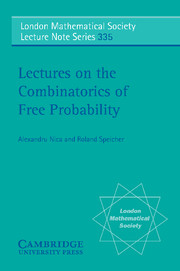Book contents
- Frontmatter
- Contents
- Introduction
- Part 1 Basic concepts
- Part 2 Cumulants
- Part 3 Transforms and models
- Lecture 16 The R-transform
- Lecture 17 The operation of boxed convolution
- Lecture 18 More on the one-dimensional boxed convolution
- Lecture 19 The free commutator
- Lecture 20 R-cyclic matrices
- Lecture 21 The full Fock space model for the R-transform
- Lecture 22 Gaussian random matrices
- Lecture 23 Unitary random matrices
- Notes and comments
- References
- Index
Lecture 19 - The free commutator
Published online by Cambridge University Press: 06 July 2010
- Frontmatter
- Contents
- Introduction
- Part 1 Basic concepts
- Part 2 Cumulants
- Part 3 Transforms and models
- Lecture 16 The R-transform
- Lecture 17 The operation of boxed convolution
- Lecture 18 More on the one-dimensional boxed convolution
- Lecture 19 The free commutator
- Lecture 20 R-cyclic matrices
- Lecture 21 The full Fock space model for the R-transform
- Lecture 22 Gaussian random matrices
- Lecture 23 Unitary random matrices
- Notes and comments
- References
- Index
Summary
The original use of the R-transform was in connection to the problem of describing the distribution of a sum of free random variables (via the formula Ra+b = Ra + Rb, which always holds when a is free from b in some non-commutative probability space – cf. Lectures 12 and 16). Similarly, the S-transform was introduced to solve the problem of multiplication of free random variables (cf. Lecture 18). By following these lines, it is natural to ask what happens when one considers the commutator ab−ba, or the anti-commutator ab+ba of two free elements. Some remarks about this have already been made in Lecture 15. In the present lecture we will continue the discussion started there, by using the convenient language of the operation of boxed convolution.
The problem of the free commutator can be treated on two levels, which will be discussed separately.
First there is a level where one considers even random variables. At this level the problem can be solved as an application of the results on R-diagonal elements. One comes to a formula which is at the same time valid for the anti-commutator (of two free, even random variables), and which was already presented in Theorem 15.20.
Then there is the general level, where the assumption that the random variables are even is dropped. Quite surprisingly, it turns out that the free commutator (unlike the free anti-commutator) is still described in this case by the same formula as we had in the even case.
- Type
- Chapter
- Information
- Lectures on the Combinatorics of Free Probability , pp. 303 - 320Publisher: Cambridge University PressPrint publication year: 2006

